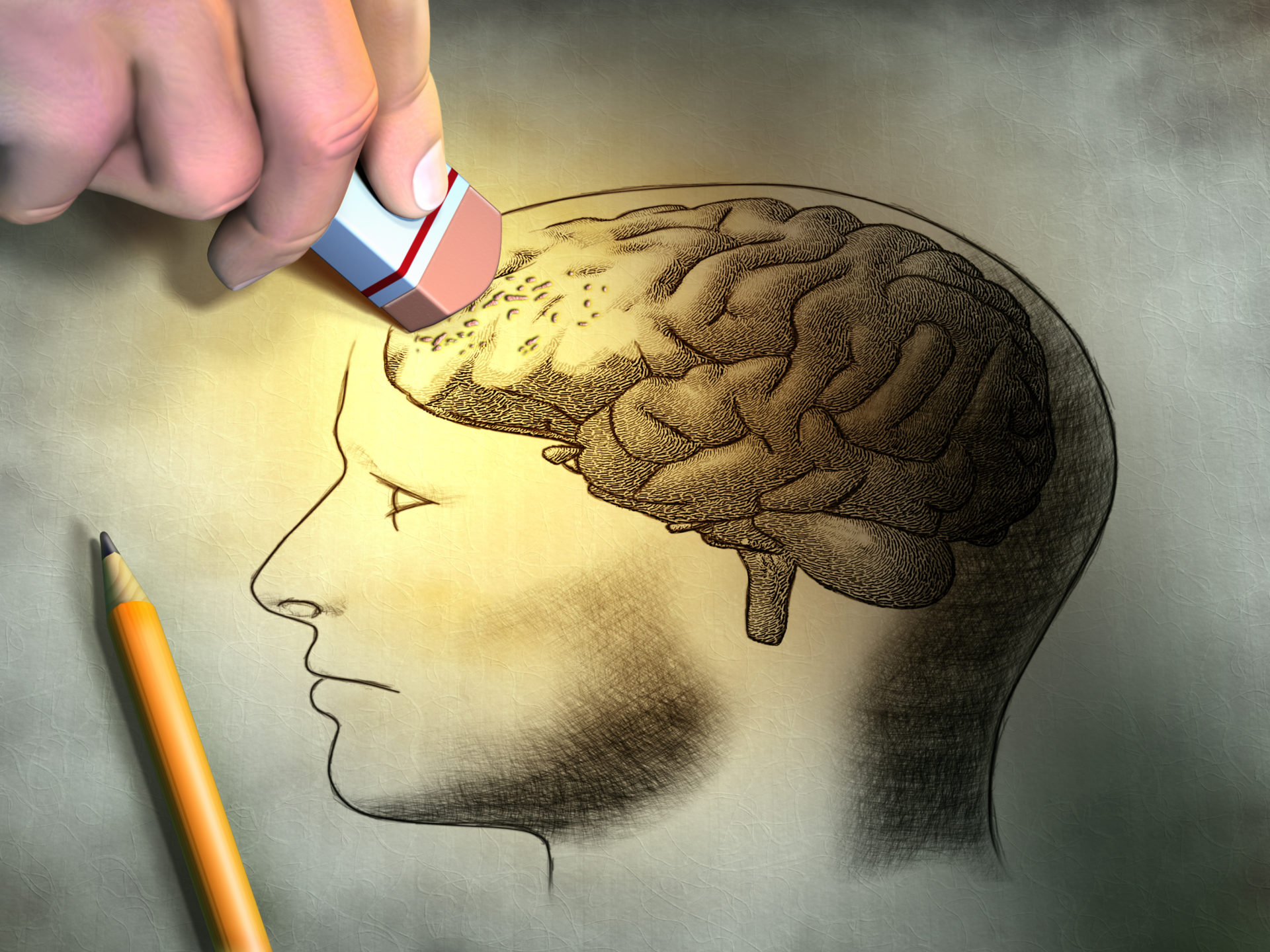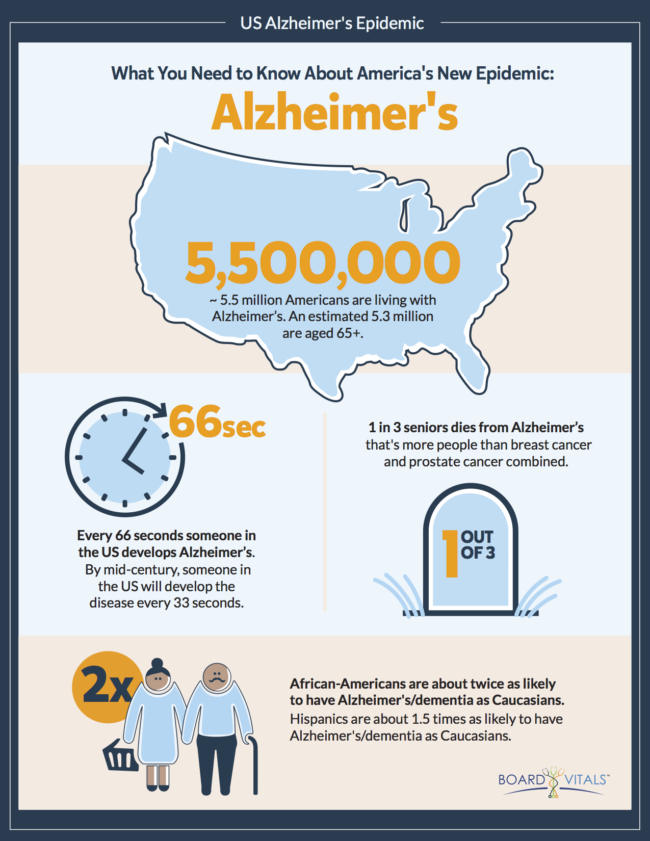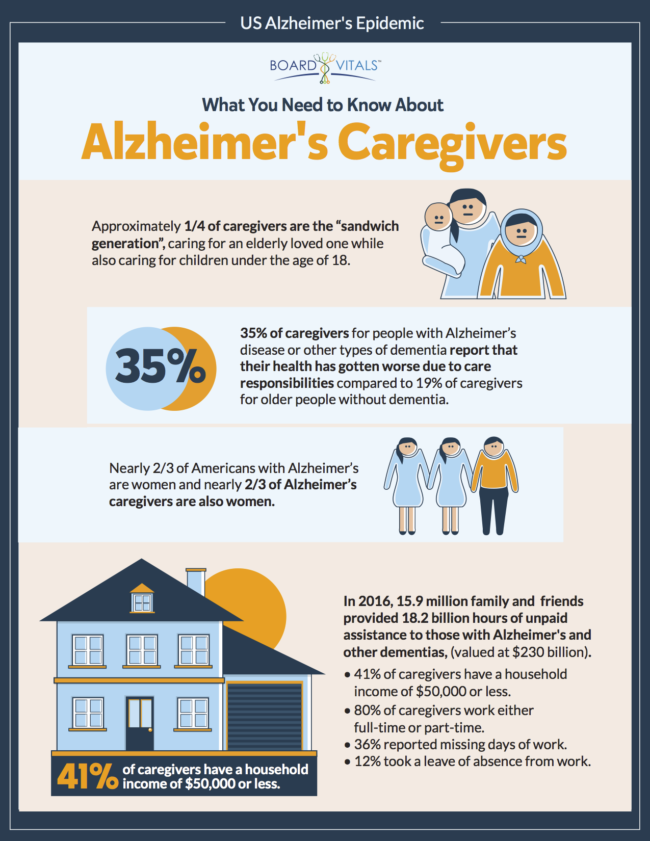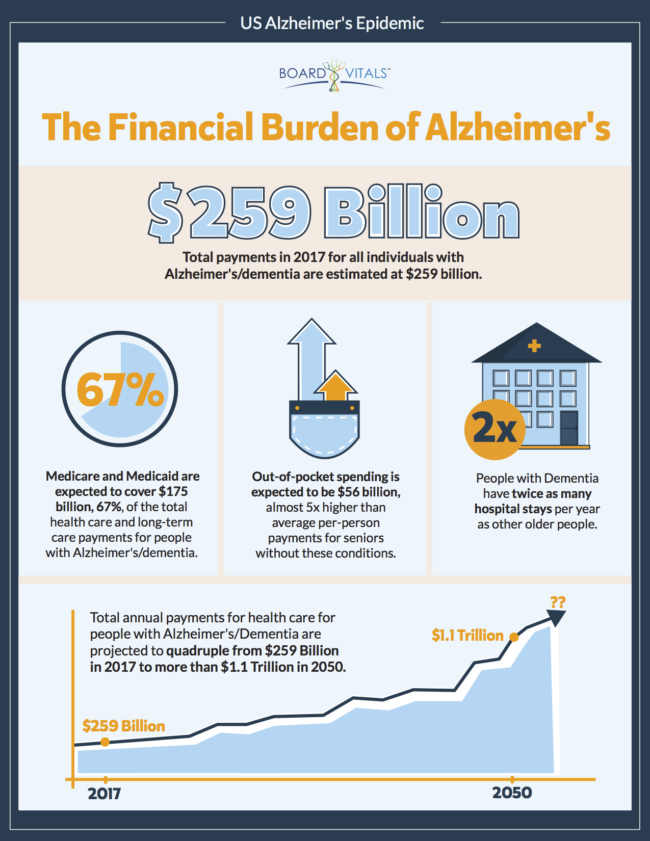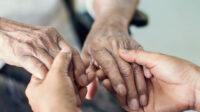Alzheimer’s disease, a form of dementia, is reaching epidemic proportions in the United States. As the baby boomer population ages, there will be never-before-seen levels of dementia in the US. Whether in a hospital or private practice, in the coming years you will see increasing numbers of people with dementia, and their highly stressed caregivers.
What you need to know about Alzheimer’s:
Millions of Americans have Alzheimer’s
- Approximately 5.5 million Americans are living with Alzheimer’s
- An estimated 5.3 million are aged 65+
- Approximately 200,000 are under age 65
- Every 66 seconds someone in the US develops the disease
- By mid-century, someone in the US will develop the disease every 33 seconds.
Alzheimer’s is a leading cause of death
- 1 in 3 seniors dies from Alzheimer’s – that’s more people than breast cancer and prostate cancer combined.
- Since 2000, deaths from heart disease have decreased by 14%. Deaths from Alzheimer’s have increased by 89%.
- Alzheimer’s is the sixth-leading cause of death in the US; the fifth-leading cause among those aged 65+.
- It is the only top 10 cause of death that cannot be prevented, cured or even slowed.
- Among people age 70, 61% of those with Alzheimer’s are expected to die before the age of 80 compared with 30% of people without Alzheimer’s, double the rate.
Alzheimer’s strikes women and minorities
- Almost 2/3 of Americans with Alzheimer’s are women.
- African-Americans are about twice as likely to have Alzheimer’s/dementia as Caucasians.
- Hispanics are about 1.5 times as likely to have Alzheimer’s/dementia as Caucasians.
What you need to know about caregivers:
Caregivers are highly stressed and many suffer from compassion fatigue and/or burnout. Approximately 1/4 of them are the “sandwich generation”, caring for an elderly loved one while also caring for children under the age of 18. They juggle caregiving, careers, home, and personal life, sometimes at great personal expense. When you see a person suffering from dementia in your practice, realize that the caregiver may need as much, if not more, support than the patient.
Nearly 2/3 of Americans with Alzheimer’s are women and nearly 2/3 of Alzheimer’s caregivers are also women. It is estimated that 34% of them are age 65+. At some point, as the population ages, that math isn’t going to work out.
Providers need to be sensitive to the plight of women as caregivers. It can be a root cause of depression, weight loss or gain, apathy, sleep problems, physical exhaustion, aches, pains, and more.
- 35% of caregivers for people with Alzheimer’s disease or other types of dementia report that their health has gotten worse due to care responsibilities.
- Compared to 19% of caregivers for older people without dementia.
- Statistics show that twice as many caregivers for those with dementia report substantial emotional, financial and physical difficulties.
- 41% of caregivers have a household income of $50,000 or less.
- In 2016, 15.9 million family and friends provided 18.2 billion hours of unpaid assistance to those with Alzheimer’s and other dementias, (valued at $230 billion).
Caregiving impacts the ability to hold down a job
The National Alliance for Caregiving with Zogby International conducted a study of 1,130 long-distance caregivers to assess the impact of caregiving on work. The findings clearly show the price that caregivers pay, literally and figuratively speaking, while trying to hold down a job. 80% of the participants in the study worked either full-time or part-time.
- The percent of long-distance caregivers working part-time increased substantially from the 1997 study, from 8% to 18%.
- More than 2/5 had to rearrange their work schedules to address caregiving responsibilities.
- 36% reported missing days of work.
- 12% took a leave of absence from work.
- Men and women in equal numbers had to rearrange work schedules – leaving early, arriving late, taking unpaid leave, or considering changing employers to accommodate caregiving responsibilities.
The costs of care for those with Alzheimer’s disease is substantial
Dementia is ranked as one of the costliest health conditions in the US.
- Total payments in 2017 for all individuals with Alzheimer’s/dementia are estimated at $259 billion.
- Medicare and Medicaid are expected to cover $175 billion, (67%), of the total health care and long-term care payments for people with Alzheimer’s/dementia, more than three times larger than payments for other Medicare beneficiaries.
- Out-of-pocket spending is expected to be $56 billion, almost five times higher than average per-person payments for seniors without these conditions.
Health care costs increase with the presence of Dementia.
- People with Dementia have twice as many hospital stays per year as other older people.
- Medicare beneficiaries are more likely than those without Dementia to have other chronic conditions.
- People with Alzheimer’s/Dementia make up a large proportion of all elderly people who receive adult day services and nursing home care.
Costs are going to quadruple.
- Total annual payments for health care, long-term care and hospice care for people with Alzheimer’s/Dementia are projected to increase from $259 billion in 2017 to more than $1.1 trillion in 2050.
- This dramatic rise includes more than four-fold increases both in government spending under Medicare and Medicaid and in out-of-pocket spending.
Your future patients
Until the millennials were born, baby boomers were the largest demographic ever seen in the US. According to the US Census Bureau:
- There were 40 million Baby Boomers over the age of 65 in 2011. There will be 50 million by 2019.
- The oldest old, those aged 85+, numbered 3.5 million in 1994.
- That will double to 85 million by 2020.
- It will double again by 2040 as baby boomers hit that age.
Baby boomers have single-handedly changed every societal system they have come in contact with from retail products to healthcare. As they age, their sheer numbers will continue to force innovations in senior care.
Researchers and scientists are working feverishly to decode Dementia to find an earlier diagnosis, better treatments and hopefully a cure. Others are trying to ramp up public awareness of the importance of practicing a brain-healthy lifestyle to ward off the onset of Dementia.
As a physician on the front line of healthcare, you will be the first ones to see these patients and their caregivers. Increased awareness of this epidemic and the ability to direct caregivers toward effective resources will help them to bear up under the burden of providing 24/7 care and help to give the Alzheimer’s patient improved care.
Disease stats by state: http://www.alz.org/documents_custom/2017-facts-and-figures.pdf
